How can you get rid of ants in your garden effectively?
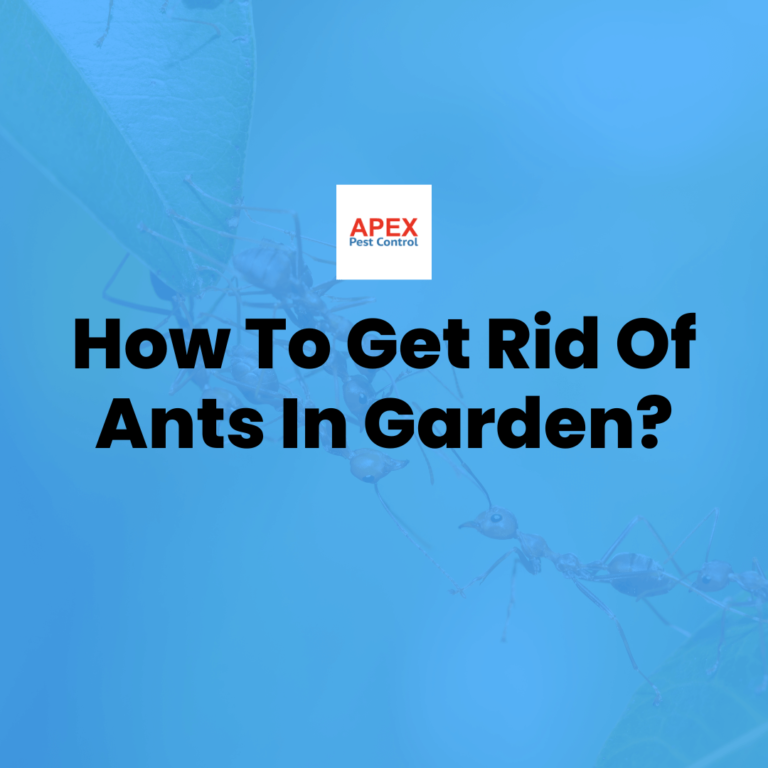
A yard is a peaceful place for many people to be because it’s right outside their door. What will happen, though, if little attackers threaten this peace? You get it—people are talking about ants.
Some people think of them as natural wonders, but others think of them as very annoying pests in our gardens. Today we’re going to talk about how to get rid of ants in your yard in a way that is both quick and good for the environment.
How to Understand Ants in UK Gardens
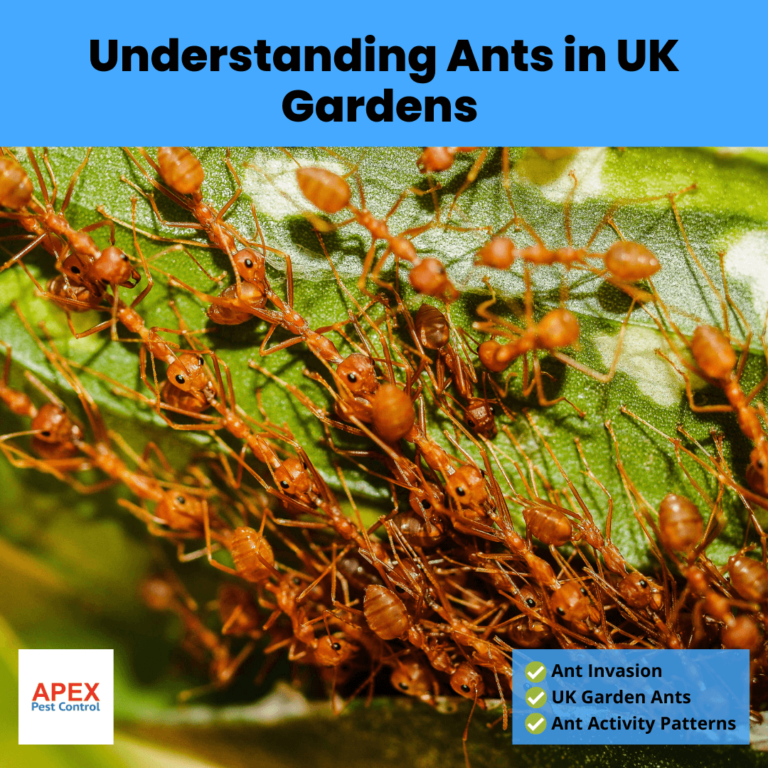
As their numbers grow, ants can become a threat to people who live in fields, even though they are an important part of the ecosystem. Learning about these interesting animals can help us get rid of ants more effectively, keeping them out of our flower beds where they can hurt the plants.
Read our post on how to get rid of ants in your house to learn more about how to keep them out.
Ant Activity Patterns
In the UK, ants are most busy in the spring and summer. This is true for both common garden ants and less common carpenter ants. The conditions around you are good for this exercise.
Around this time, ant problems can get worse, so people who own their own homes should be aware of this trend. Also, having ants in the yard can help get rid of other pests, but if they get out of hand, they can cause problems like ant hills that hurt lawn grass or ants protecting aphid nests that make the problem worse.
Different Kinds of Ants You Might Find in Your Yard
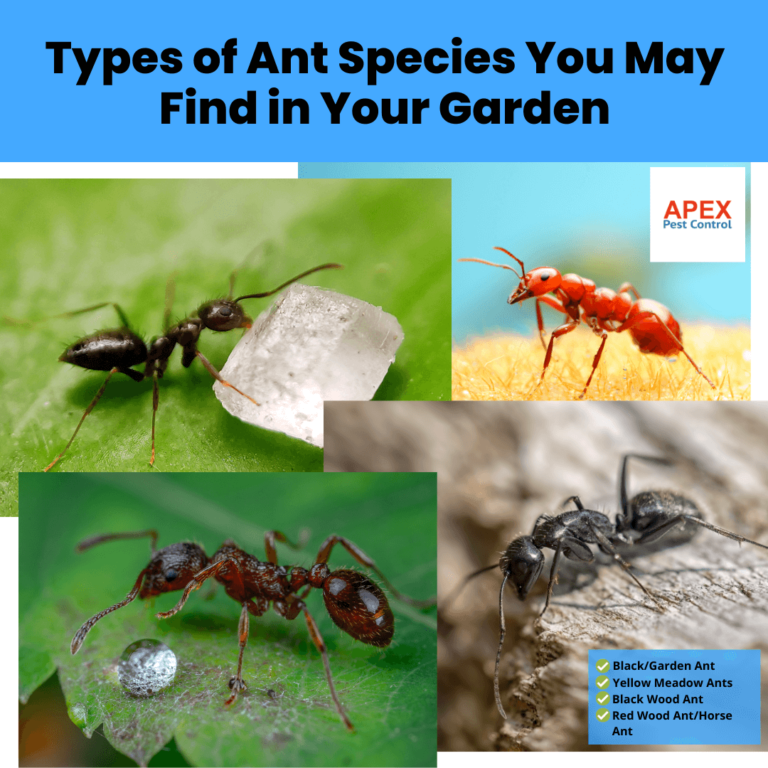
Black/Garden Ant (Classius niger)
People in UK parks may know this species of ant better than any other. Since they are known to go straight for food, it’s no surprise that they often get into our homes, which is why many people are interested in killing them.
Appearance and Habitat: These black ants build their nests almost anywhere, like in compost piles, next to fields, and under sidewalks. Ant colonies can have up to 15,000 individuals, so it’s not strange to see a few of them while walking around the yard.
Diet: These ants mostly eat bugs, but they also like sweet things. People have also seen them eating the bodies of enemies or ants from other colonies that have died.
Defence Mechanisms: Their jaws and formic acid are their main defence mechanisms, which make any ant attack a strong one.
Yellow Meadow Ants (lasius flavus)
The yellow meadow ant is another species that is common in fields across the UK. Its yellow-orange colour makes it easy to mistake it for a red ant.
Appearance and Habitat: These ants are known for being the best at building nests. They may make big ant hills in fields or small mounds in our gardens. A good chance is that you stepped on this species of ant while working with other people.
Diet and Behaviour: Most of these ants hunt underground. People who live nearby don’t see them very often unless something upsets their nest or they are flying to mate. But keep in mind that they are still there, working hard below the surface.
Red Wood Ant/Horse Ant (formica rufa)
This species lives along the edges of forests in the UK.
Appearance and Habitat: Formica rufa ants, which are sometimes called “wood ants,” are amazing bugs that build huge piles of pine needles. It’s amazing how well-built their ant hills are.
Behaviour: These ants act in a very mean way. If you get too close, they bite and spray formic acid. Because of this mix, they can successfully protect their ant colony, which ensures its success.
Special Mention: It is the largest ant species in the UK and eats the young of other ant species, like Formica fusca, and also raids their homes. How things have changed in the world of ants!
Black Wood Ant (formica fusca)
Even though they are wood ants, this type is not as brave as the red ones.
Appearance and Habitat: These ants are black and like to make their houses under dead trees. Animal lovers who like wildlife gardens often see them because they live in the Midlands and southern England.
Colony Dynamics: Usually, there are less than 1,000 ants living in each colony. Not like other ant species, they usually don’t have more than one queen, but they can if they want to.
Natural Strategies to Repel Ants
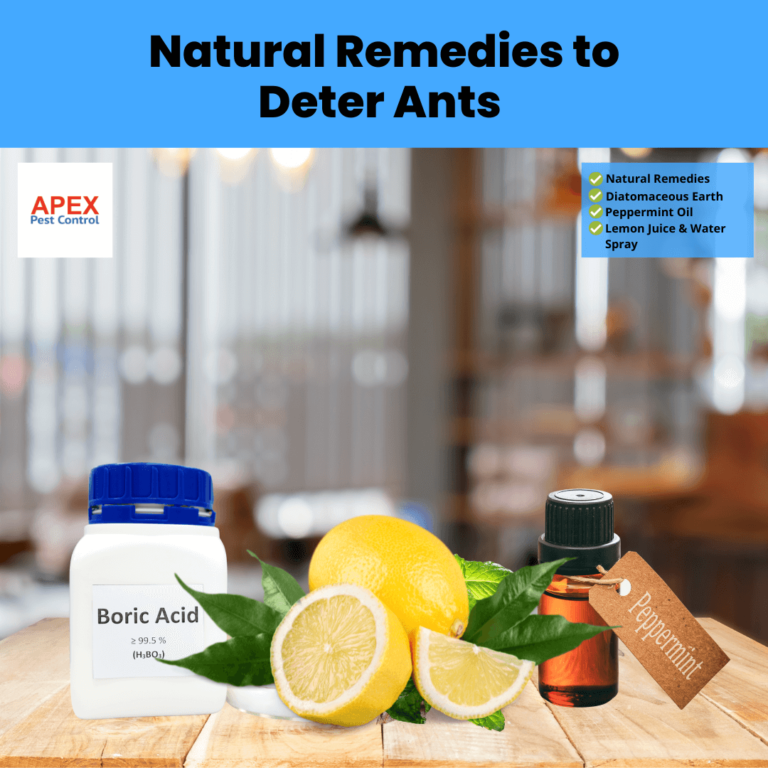
When it comes to controlling ants in our gardens, a lot of us decide to take the organic route. In our gardens, natural solutions preserve the balance of the ecosystem while protecting against the damage that harsh chemicals can do. Let’s now examine some of these fantastic pest control methods.
Diatomaceous Earth
Diatomaceous earth, or DE for short, is a powdery substance formed of fossilised aquatic organisms called diatoms. Because it doesn’t endanger larger species, it’s an organic pest control suitable for food usage.
It functions as a little barrier to keep ants from passing through. Ants become dehydrated due to the small injuries they receive from the sharp edges of DE particles. This method prevents ant populations from expanding out of control. DE provides additional protection beyond merely keeping ants away.
It’s known to be effective against the majority of ants and other insects that could damage garden plants. But keep in mind that while it effectively eliminates ants, it has no negative effects on our green companions, the plants.
Lemon Juice & Water Spray
Some smells draw ants in, while others drive them away. Lemon is one such scent. All you need is a spray bottle, some lemon juice, and water to make an eco-friendly ant repellant.
Applying this combination to ants will eliminate their scent and cause their trails to become disorganised. It tells the ants, very subtly, that they are not the only ones who are not invited to the party in the garden. Garden ants can eventually become tired of moving into areas where they frequently get lost.
Peppermint Oil
Ants bite the bullet and stay away from the fresh aroma of peppermint, even though homeowners may adore it.
You may make a big difference by lightly misting plant beds or the lids of compost bins with peppermint oil. Not only does it repel ants, but it also deters other pests. Additionally, because ants eat a wide range of foods, this aromatic oil can impede the ant larvae’s access to food by blocking their path.
Boiling Water
Whenever there is a significant ant invasion or when the ant hills become too obvious, one may consider taking drastic measures.
All it takes to get immediate advantages is to cover the anthills with boiling water. This tactic drastically lowers the population of worker ants, which are the ants that forage for food and protect aphids from their tasty secretions. But always exercise caution so as not to damage plant roots or tiny, beneficial worms that live in the soil.
Chemical Solutions for Effective Results

Sometimes, despite the allure of natural remedies, homeowners would prefer to deal with ants in the garden more quickly. Next are chemical therapies, which require precise application but are speedier and more effective.
Ant Baits
Ant baits are the long game when it comes to controlling ants. By using these bait stations, you are not just targeting individual ants but the entire colony.
Consider it a hobgoblin. The worker ants are drawn to the bait, and when they bring it back to the nest, they inadvertently expose the entire colony to a harmful material.
Ant baits are stunning due to their comprehensive approach. As they disperse the bait throughout their colony, even the ants that frequently remain hidden—such as the queen and the ant larvae—are reached.
Because of this disruption to the ants’ life cycle, the population of these insects is drastically reduced in a matter of weeks. Furthermore, although the bait looks like food for ants, it is safe for larger garden animals.
Insecticidal Soap
An environmentally friendly method of managing ants and other pests is to use insecticidal soaps. Being constructed of organic materials, they provide an alternative to the more potent chemical sprays seen in garden centres.
When the ants are sprayed, the fatty acids in the soap breakdown their outer layer, causing them to get dehydrated and eventually die. It’s a softer, gentler relative of chemical sprays that repels ants just as effectively.
Because it is composed of organic stuff, it is harmless for the garden’s environment and beneficial to insects. The root systems of garden plants and flower beds are also safeguarded by this method.
Chemical Sprays
In extreme cases, homeowners may consider employing chemical sprays, a heavy weapon, to control their ant infestation. They act fast, ensnaring ants immediately and keeping them from fleeing.
Although they have their uses, chemical sprays should be used carefully. Always read the label to make sure it doesn’t harm beneficial garden species.
It’s also a good idea to remember that although ant-specific pesticides target certain ants, they may not be the most effective long-term ant control solution. Overuse can result in a buildup in the soil that could make it more difficult for plants to absorb sap or possibly attract more predators.
If you must use chemical sprays, protect certain areas with a spray bottle and gloves to avoid unintentionally harming beneficial insects like bees or specific plant species.
Keeping Insects Out of the Garden
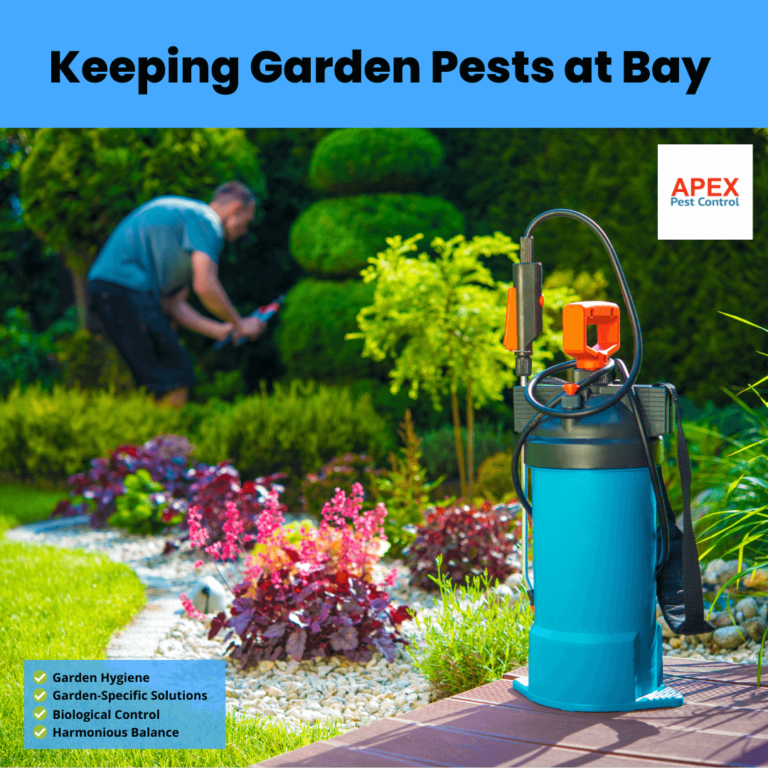
Garden Hygiene is Key
Gardening is more than just sowing seeds and watering them; it’s also about keeping the ecosystem in balance. Reactive ant control techniques, including the use of ant powders or boiling water treatments, are frequently unnecessary when a proactive plan centred on garden hygiene is implemented.
Tidiness
Not only does a well-kept garden look better, but it also acts as a strategic deterrent to pests like ants. Regularly removing old wood, checking that plant pots are not overly wet, and raking away fallen leaves will help ward off a lot of pests.
Starving the Intruders
Ants generally enter gardens in search of food. By removing food sources, especially the little insects that they feed on, and making sure that no food-grade diatomaceous earth or similar attractants are left behind, homeowners can lessen the allure of their plots. Think of it as defending your garden from the ant colony’s interpretation of a cow!
Keeping Unwanted Guests Out
Like any house, a garden has its entry points. Make sure that small holes in fences or the borders of flower beds are sealed to keep ants out. It’s like shutting the door on uninvited guests.
Natural Deterrents
Ants can be kept out of a space by using natural barriers like cracked eggshells or even spraying boric acid. Extra safeguards for plants can be a coating of baking soda or baby powder, both of which are completely harmless.
Citrus peels, especially those from oranges and lemons, can also act as a scent repellant, causing ants to rethink their entrance, if you’re feeling very creative.
Natural Predators
The natural order should be understood by every household member. The roles that ants and their natural predators perform in the ecosystem are distinct. There are benefits to accepting this biological control approach.
A bird might be a homeowner’s best friend. Not only do their symphonies amuse us, but they also manage their population by consuming ants.
Likewise, cute hedgehogs, often sighted at night investigating gardens, like nibbling on ants.
It’s a win-win situation for everyone if you provide bird feeders or hedgehog-friendly spaces. You may enjoy their company while also assisting in the management of the ant population.
Wrap-Up: Ant Elimination for Landscape Spaces
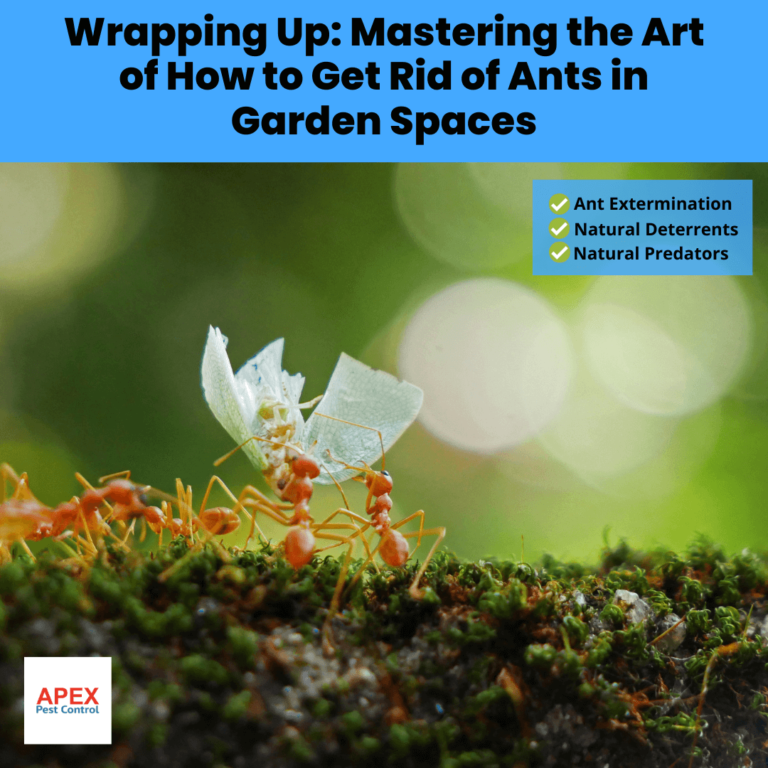
It’s ultimately more vital to find a healthy equilibrium than to wage war against ants. While gardens are for everyone, we set boundaries to ensure that our little plot of land remains a tranquil haven.
Remember, each garden is unique, as are the ant situations. Always be mindful of what is appropriate for the specific needs of your garden, even though some general guidelines may be most helpful. A garden’s overall perfection is ultimately influenced by its small nuances.
FAQs
Why are ants attracted to my garden?
Ants are often in search of food. If your garden has a few leftover foods lying around, they’ll be frequent visitors.
Can natural remedies work as efficiently as chemicals?
Absolutely! While they might act slower, they are sustainable and often safer for your garden.
Are there ants that are beneficial for my garden?
Some ants can help aerate the soil or control pests. But if they become a nuisance, you know how to handle them now!
What are some effective methods for getting rid of ants in the garden?
Natural repellents like lemon juice, peppermint oil, and diatomaceous earth can deter ants. For severe infestations, chemical sprays or baits might be more effective.
Are there any methods that can be used for killing ants without harming garden plants?
Yes, diatomaceous earth and insecticidal soaps target ants without damaging plants. Additionally, natural sprays made from lemon or peppermint oil can deter ants without harming your garden flora.
How does regular lawn care help in preventing ant infestations?
Regular lawn maintenance, such as mowing, aerating, and removing fallen leaves, reduces habitats for ants and other pests, thus preventing large colonies from establishing. I’ve noticed an ant nest in my garden.
How can I address this?
An ant nest in your garden can be treated by pouring boiling water into it, which will kill the ants inside. However, ensure surrounding plants are protected, as boiling water can harm them. Alternatively, natural repellents or ant baits can target the colony over time.
Can pouring boiling water on ant trails and nests help get rid of them?
Yes, pouring boiling water directly on ant nests can kill ants immediately. However, be cautious, as it can also damage surrounding plants and beneficial garden critters.
Is white vinegar effective in managing ant infestations in gardens?
Absolutely. White vinegar disrupts the scent trails ants follow. Spraying a solution of equal parts water and white vinegar on ant trails can deter them from returning.